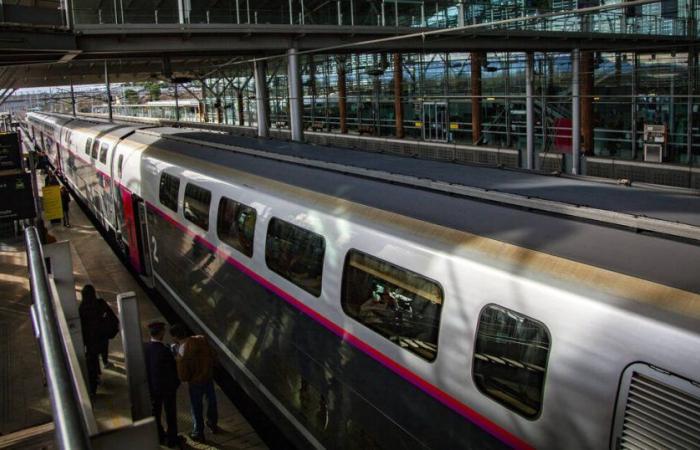
The railway company has chosen to close the busiest route in Europe between Paris and Lyon from November 9 to 12 for works. She assures that this decision will have little impact on travelers.
“It’s incomprehensible.” Laura may turn the problem around in every direction, but she cannot understand why the SNCF is undertaking major work on the Paris-Lyon TGV line on the weekend of November 11. It was precisely on these dates, taking advantage of the public holiday, that the 25-year-old young woman hoped to join her family in Nice to celebrate the 50th birthday of her mother, born on the 10th. If she was able to book a ticket on Friday evening – “which still cost 100 euros with the youth card” –, she found herself without a solution to return to Paris on Monday and had to resolve, reluctantly, to take a plane. “Why close such an important road on a public holiday weekend? Why not the following weekend? she wonders, like many other travelers.
This complete interruption of rail traffic was “planned years in advance”, responds the SNCF Réseaux group, contacted by Liberation. To equip the link with a new signaling system, work has been underway for five years, at night. To finalize the complete replacement of the device, the company assures that it will need “four days of interruption” of the TGV line. Against all expectations, this “long weekend of November 11” represents according to SNCF Réseaux “the niche with the least impact for travelers” because the company says it has observed “drops in attendance” during long weekends including a public holiday. Syears to be able to support this assertion with quantified data from Liberation. For the SNCF, these few days of work are therefore akin to “an almost transparent operation for travelers”.
“You can’t make an omelette without breaking eggs”
The SNCF Réseaux group ensures that it has nevertheless done everything possible to limit the repercussions on travelers. The trains were never put on sale and an information banner appeared on the SNCF application and website since the start of the year. The classic TER lines, which are maintained, act as a plan B for users – although it should be noted that travel times will be doubled. From the capital, it will take 4.5 hours to go to Lyon instead of two hours, 7.30 hours to Marseille compared to three hours. The trains will not go further than Toulon and Montpellier Saint-Roch, and will therefore not serve either Nice or Perpignan. Extra-regional connections will also not be ensured: no Nantes-Lyon, Lyon-Rennes, Le Havre-Marseille or even Lille-Marseille will run during these four days.
The SNCF, for its part, claims to have preserved departures on Friday, November 8, by not starting the work until the next day. But seems to have forgotten the returns, since the end of all this agitation is not expected until Wednesday, November 13 in the morning. “You can’t make an omelette without breaking eggs, justifies the railway company. There is a real benefit behind all this. From 2030, we will have 16 TGVs per hour and per direction compared to only 13 today. That’s what wanting more trains and developing the railways is.
These arguments go down badly with the National Federation of Transport User Associations (Fnaut). “To say that there is no impact on customers is false. From the point of view of users, long weekends represent peaks in attendance on Friday evening and Saturday morning, as well as on Monday evening, for the return to work on Tuesday. deplores Gérald Petitgand, president of the Auvergne-Rhône-Alpes branch of the Federation. “But their choice also penalizes people who go to work, since the work lasts until Tuesday evening!” observes Laura, who had to take the day off on Tuesday.
“Same prices as a TGV, for twice as long travel time”
“I could only return by train from Nice by choosing an 11-hour journey with several connections and paying 105 euros, a higher rate than usual,” calculates the young woman. “The cost alerts us, because we should not pay the same prices as a TGV, for twice as long a journey time,” adds Gérald Petitgand who is alarmed “a degraded customer experience”.
“This work is essential,” the user advocate readily admits. “I understand the choice to do them in “big bang” mode rather than spreading them out over several nights for months. The problem is the choice of date and the overall lack of communication. regrets Gérald Petitgand. This is not the first time that the railway company has chosen to paralyze the network over a long weekend. Last March, it was impossible to reach Toulouse from Paris during the Easter weekend. The Bordeaux-Toulouse line was closed for railway development work and switch renewals. The SNCF also wanted to be accommodating in carrying out this work “in the depths of the weekend”and not in the middle of the week. Even if it means sacrificing a few moments of reunion.





